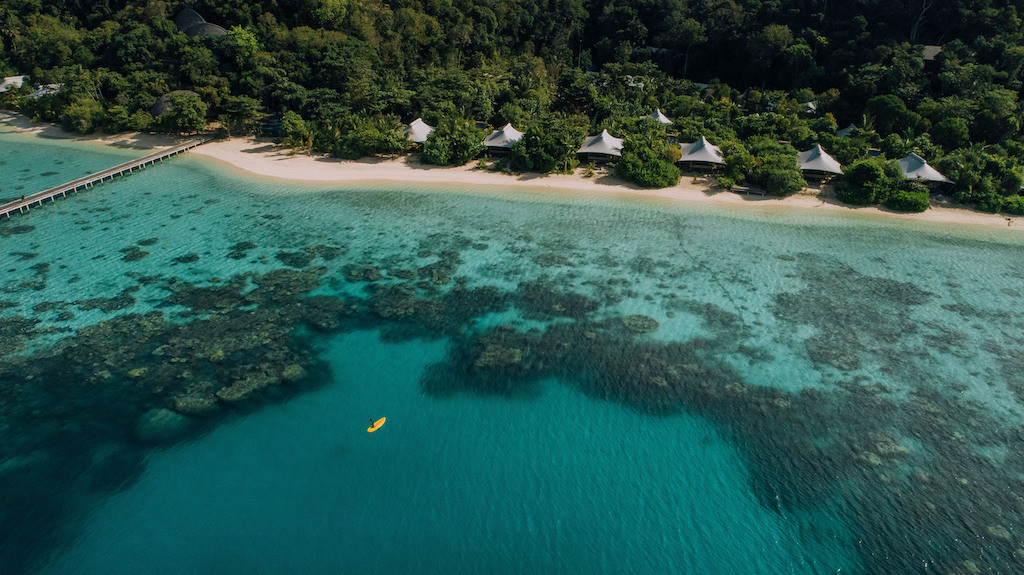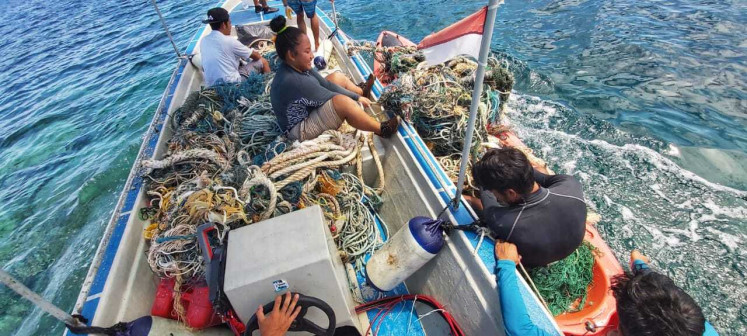Popular Reads
Top Results
Can't find what you're looking for?
View all search resultsPopular Reads
Top Results
Can't find what you're looking for?
View all search resultsRemote Indonesian resorts shift focus of operations amid COVID-19 restrictions
With the pandemic came travel restrictions. Two remote resorts in Indonesia are finding ways to cope with the changes.
Change text size
Gift Premium Articles
to Anyone
T
he luxurious, tropical villas of Bawah Reserve in Riau are empty. Not a single guest sits on the beaches or wades in the crystalline waters. The reserve is not deserted though. Staff members are stuck on the resort due to COVID-19 travel restrictions and have had to adapt their work. Instead of catering to guests, they’re focused on the islands.
While the COVID-19 crisis has restricted travel, two of Indonesia’s most remote luxury resorts have shifted operations in the face of impending cutbacks. Through a focus on conservation efforts and a plan to serve local populations, Bawah Reserve and Nihi Sumba seem to be staying afloat for now.
Bawah Reserve consists of six islands about 160 miles northeast of Singapore. The resort celebrated its second year on Feb. 15. Just as Bawah Reserve hit its two-year mark, COVID-19 began spreading rapidly across the globe, sparking confusion and uncertainty.
“We were clamoring to try to find information,” said Paul Robinson, COO of Bawah Reserve.
Robinson said that as the crisis worsened in March, staff scrambled to get guests back to their home countries. In the end, they were able to get everyone off the islands just before airlines began to restrict travel.
“As soon as the airlines started to cut back capacity, that was, I guess, the nail in the coffin,” said Robinson.
In early April, Indonesia temporarily banned foreigners from entering the country. Though there were a few exceptions to the new rule, tourism for remote, high-end resorts was done for.
Even though the reserve had to be closed, the entire Bawah Reserve staff of over 200 workers has been able to stay employed at full salary. However, Robinson said in July they would likely have to lay off some workers, reduce salaries and move to a shorter work week.
For the 76 staff members stuck on the reserve now, work continues. Unable to travel off the reserve and without guests, staff shifted their attention to conservation and island maintenance. Workers have been planting trees, landscaping and cleaning beaches.
Over the past couple months, they have pulled over a ton of fishing nets out of the ocean around the reserve. More workers have been trained to dive, which has increased the amount of ocean cleanup the staff can take on. Instead of doing cleanups once a week as usual, they now do them almost every day.
Being stuck on the reserve can also be difficult for some workers. Some miss their families and don’t know when they’ll be able to travel to see them again.
Read also: Indonesian hotels, resorts recognized at World Travel Awards
“The hardest part is family, because we are here on a remote island and our family is in the world out there, probably not as safe as we are now,” said Sakti Nasukha, environmental activities manager of Bawah Reserve. “We are taking everything a day at a time.”
Nasukha isn’t upset about being on the reserve. She’s been able to invest her energy in the conservation efforts, spend time exploring new nature trails and bond with her coworkers. And the remote location is an advantage when it comes to staying safe.
Still, Robinson hopes normalcy will return. “I’m longing for flights to resume and for doors to be reopened,” said Robinson. But he acknowledged it could be at least a year before that happens.
Hundreds of miles to the south is Nihi Sumba, another remote Indonesian resort that is making changes due to the pandemic.
Situated on the island of Sumba, it has a staff of about 400 people. So far, the resort has been able to keep all staff members but has had to decrease salaries by 50 percent. Because most of their income is made from service charges, workers make significantly less money. This month, salaries will likely have to be decreased further and if the resort can’t reopen, layoffs will be necessary.
Looking forward, Nihi Sumba is changing its target demographic. James McBride, partner and CEO of Nihi Sumba, shared his thought that travel and tourism would change after the pandemic, at least for a while. McBride said people would mostly stick to their own countries and focus on regional travel.
In preparation for that change, Nihi Sumba is making adjustments to draw in Indonesian guests.
“It’s an opportunity,” said McBride. “I want to be aligned with our Indonesian market.”
Normally, about 55 percent of Nihi Sumba’s business came from North America. McBride said that won’t be a reality again for some time. Now, Nihi Sumba is working on creating new price points to target the Indonesian market.
“For the rest of the year we’ll be a completely different business model,” said McBride. “I would love people to be able to benefit, to enjoy a beautiful place in their own land.” (wng)
-----------------
The writer is an intern at The Jakarta Post.







